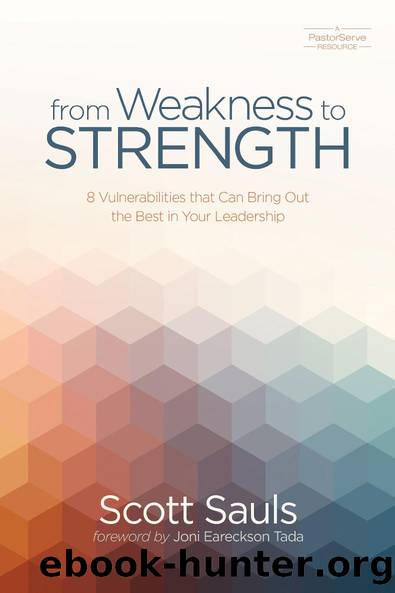From Weakness to Strength by Scott Sauls

Author:Scott Sauls
Language: eng
Format: epub
Tags: Weakness to strength;Christian leadership;Leading with character;Struggling leaders;Church leaders;Moving from weakness to strength;Healthy leaders;Lead like Christ
Publisher: David C. Cook
Published: 2017-08-16T20:45:57+00:00
“A person who has toiled with wisdom and knowledge and skill must leave everything to be enjoyed by someone who did not toil for it. This also is vanity and a great evil. What has a man from all the toil and striving of heart with which he toils beneath the sun? For all his days are full of sorrow, and his work is a vexation. Even in the night his heart does not rest. This also is vanity.”
Ecclesiastes 2:21–23
Chapter 6
Anticlimax: A Gateway to Hope
Like many top leaders, the ancient writer of Ecclesiastes had succeeded by virtually every earthly measure. He had created great works, built magnificent houses, planted fruitful vineyards, and made beautiful parks. He had a large staff working for him and great possessions, herds, flocks, silver, gold, and treasure (Ecclesiastes 2:4–11). The ancient writer was a picture of a self-made man, of a businessman and leader who had “made it,” and whose dreams had been fulfilled to the uttermost.
Yet, in spite of such great success, he described his experience of success as one of vexation. To be vexed is to be bothered, annoyed, irritated. Shakespeare used a form of the term at the beginning of A Midsummer Night’s Dream to describe a father who was intensely troubled by his daughter: “Full of vexation come I, with complaint / Against my child, my daughter Hermia.” Vexation is severe distress—as the writer of Ecclesiastes used the word, he hated life, he lived in despair, and he saw everything about his life, including his success, as empty and vain (Ecclesiastes 2:17–26).
The writer was simply telling the truth about life in a fallen world—namely, that we can give our lives to a vision or set of goals, end up achieving them, and still be unsatisfied. Very common to the human experience is the feeling that nothing, ultimately, will satisfy the longings we have. In a very real sense, the best we can hope for is an ability to enjoy some of our successes and, in the end, to die. Perhaps it’s partly the looming reality of death that spoils our enjoyment of even our greatest accomplishments and successes.
A recent edition of Business Insider reported that Markus Persson, the thirty-six-year-old founder and president of Minecraft, sold the company for a whopping $2.5 billion. Following the sale, he purchased a $70 million mansion and spent his days “living the dream” with lavish parties, high-end vacations and world travel, and making friends with famous celebrities.
At the peak of his success, when those looking at his life from the outside might assume he was one of the happiest, most fulfilled people in the world, Persson sent out two reflections on Twitter that told a very different story:
The problem with getting everything is you run out of reasons to keep trying.
Hanging out with a bunch of friends and partying with famous people, able to do whatever I want, and I have never felt more isolated. 1
Similarly, a friend recently sent me an essay about the Silicon Valley work culture.
Download
This site does not store any files on its server. We only index and link to content provided by other sites. Please contact the content providers to delete copyright contents if any and email us, we'll remove relevant links or contents immediately.
Joan of Arc by Mary Gordon(3258)
Victory over the Darkness by Neil T. Anderson(2386)
The Gnostic Gospels by Pagels Elaine(2026)
Devil, The by Almond Philip C(1899)
The Nativity by Geza Vermes(1849)
The Psychedelic Gospels: The Secret History of Hallucinogens in Christianity by Jerry B. Brown(1826)
Going Clear by Lawrence Wright(1571)
Going Clear: Scientology, Hollywood, and the Prison of Belief by Lawrence Wright(1570)
Barking to the Choir by Gregory Boyle(1507)
A TIME TO KEEP SILENCE by Patrick Leigh Fermor(1499)
Old Testament History by John H. Sailhamer(1495)
Augustine: Conversions to Confessions by Robin Lane Fox(1473)
A History of the Franks by Gregory of Tours(1398)
The Knights Templar by Sean Martin(1393)
A Prophet with Honor by William C. Martin(1373)
The Bible Doesn't Say That by Dr. Joel M. Hoffman(1372)
by Christianity & Islam(1347)
The Amish by Steven M. Nolt(1253)
The Time Traveler's Guide to Medieval England by Ian Mortimer(1215)
